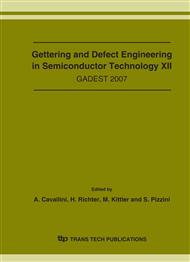p.1
p.9
p.15
p.21
p.27
p.33
p.39
p.47
Divacancy Induced Improvement for Stabilization of Silicon Conductivity versus Temperature
Abstract:
In present work temperature stable conductivity is considered for neutron-doped FZ silicon with point radiation defects. It was shown that divacancy formed after electron irradiation allow to increase resistivity of silicon at room temperature, what lead to less variation of conductivity in a range of temperatures 20-160C. Discrepancy between experimental and theoretical data was evaluated and corrected with introduction in the model deep level center Ec-0.6eV. As result of investigation power resistors were elaborated with 10% deviation from nominal value within the range of temperatures.
Info:
Periodical:
Pages:
21-26
Citation:
Online since:
October 2007
Authors:
Price:
Сopyright:
© 2008 Trans Tech Publications Ltd. All Rights Reserved
Share:
Citation:


